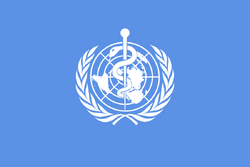
WHO Flag
The World Health Organization (WHO) is a specialized agency of the United Nations (UN) that acts as a coordinating authority on international public health.
Public Health Emergency
On Saturday, 25 April, upon the advice of the Emergency Committee called under the rules of the International Health Regulations, the Director-General declared this event a Public Health Emergency of International Concern. This is a fairly "routine" measure, which frees up money and government agencies for specific health purposes. However, the WHO is not recommending any travel restrictions.
Alert Scheme
The WHO runs a Pandemic Alert Level service. (Click link to see a full chart).
On the night of the 27th April, the WHO raised the alert level to 4 on the six-point scale. Phase 4 (Sustained Human to Human Transmission) is the result of community-wide outbreaks. Phase 5 (Widespread Human Infection) requires human-to-human transmission in at least two nearby countries. Phase 6 is a global pandemic proper.
Before the alert level was raised from 3 to 4, the WHO advised that "all countries intensify surveillance for unusual outbreaks of influenza-like illness and severe pneumonia".
Medicinal Reserves
According to La Journada (translation), the WHO has access to 3 million packs of Tamiflu, currently stored in the United States and Switzerland, should they prove to be effective and the WHO chooses to distribute the reserves. The WHO has apparently not yet sent viral samples to labs to begin the lengthy process of developing a new vaccine.
Influenza known facts
It has been known for years that [[1]] virus is carried by migratory birds, who are not usually affected. The bird droppings can infect pigs and the virus mutates there. Then humans can be infected with a new strain. Recently influenza virus has been lethal to birds and pigs.
WHO news feeds